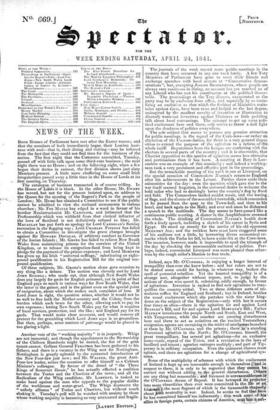NEWS OF THE WEEK.
BOTH Houses of Parliament have met after the Easter recess ; and That the members of both immediately began their London busi- ness with zeal—that is, their dining and visiting—may be inferred from the fact that they could not, find time for the business of the nation. The first night that the Commons assembled, Tuesday, passed off with little talk upon some third-rate business - the next night there was no House; and on the following night, when a few began their duties in earnest, the first division shows just sixty Members present. A little more chaffering on some small Irish irregularities passed away a little time in the House of Lords at its first meeting, on Thursday.
The catalogue of business transacted is of course trifling. In the House of I.m.ds it is blank. In the other House, Mr. EWART has moved, but not for the present insisted upon, an address to the Queen for the opening of the Regent's Park to the people of London; Mr. Hume-has obtained a Committee to see if the public cannot be admitted to view the national monuments in various churches • Mr. Fox MAITLE has edged in a word in favour of his 'brother lonintrusionist Mr. CANDLISH, and intimated that the Professorship which was withheld from that clerical infractor of the laws of Scotland is not definitively refused to him • Mr. MACAULAY has put forth an apology for Lord CARDIGAN'S Sunday recreation in the flogging way ; Lord CHARLES Frrzaor has failed to obtain a Committee to investigate the grave charges brought against Sir HOWARD DOUGLAS, of arbitrary conduct as Governor of the Ionian Islands ; Mr. GROTE has failed to relieve New South Wales from maintaining prisons for the convicts of the United Kingdom, or to release its emigration-fund from being kept in pledge for the payment of the prison-expenses; and Lord MORPETH has given up his Irish "universal suffrage," substituting an eight- pound qualification in his Registration Bill for the original ten- pound qualification.
Of these subjects, Mr. GROTE'S motion alone gave occasion to any thing like a debate. The motion was cleverly met by Lord JOHN RUSSELL; who made out, that although New South Wales does pay largely for gaols for English prisoners, yet in point of fact England pays so much in various ways for New South Wales, that -the latter is the gainer, and is the gainer even on the special point of emigration, about which she makes such complaint of loss. If Lord JOHN is right, the question arises, whether it would not be as well to free both the Mother-country and the Colony from the burden which each bears for the other, allowing each to pay its own expenses ; letting New South Wales pay for what it requires of local services, protection, and the like ; and England pay for its gaols. That would make clear accounts, and would remove all pretext for the grumbling which Lord Jowl says is so groundless. But then, perhaps, some matters of patronage would be placed in too glaring alight.


























